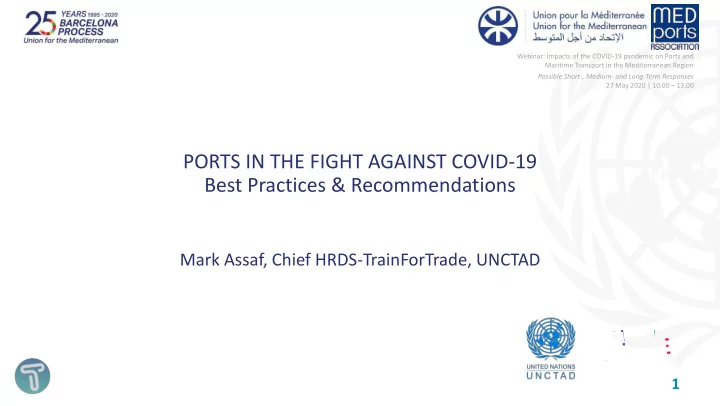

Webinar: Impacts of the COVID-19 pandemic on Ports and Maritime Transport in the Mediterranean Region Possible Short-, Medium- and Long-Term Responses 27 May 2020 | 10.00 – 13.00 PORTS IN THE FIGHT AGAINST COVID-19 Best Practices & Recommendations Mark Assaf, Chief HRDS-TrainForTrade, UNCTAD 1
BACKGROUND COVID-19 measures taken by states worldwide (216 countries & areas): ▪ Closed border ▪ Restricted travel SPEED ▪ Grounded airplanes ▪ Physical distancing ▪ Stringent containment ▪ Quarantine ➢ Choking off global supply chains ➢ Disrupting Ocean Supply Chains ➢ Economic fallout near stand still: The Great Lockdown Impeding movement of the goods and workers needed to keep the world economy alive 2
MAIN GOAL Ports’ operations continuity under COVID-19 pandemic o Ports are national strategic assets o Keep supply chains open in particular for vital merchandise o Allow maritime trade to continue o Protect critical staff in their daily tasks o Ports are front row actors’ to stop the spread of the pandemic but let the goods through 3
BEST PRACTICES Based on documentation (75) from UNCTAD TrainForTrade Port Network and other relevant entities, the following measures have been implemented/observed and could serve as generic guidelines: o Respect physical distancing rules – stay 2 metres apart o Constantly promote and enforce preventive hygiene measures (handwashing) o Limit physical interaction between onboard and onshore staff o Ship crew should communicate with quayside staff by radio or telephone o Increase the use of digital documentation to limit human contact to the minimum o Provide adequate and sufficient protective equipment to the staff (face masks, gloves, hand sanitizers, glasses) o Introduce sanitation routine of surfaces in regular contact with hands o Facilitate seafarer's rotation as per IMO protocols for welfare and safe operations (comply with international maritime regulation) 4
BEST PRACTICES o Establish a point of control in the perimeter of the port area to monitor temperature and related symptoms (automated temperature screening) and equip it with anti-bacterial solutions and sanitizers o Establish a waste disposal policy for “suspicious” cases o Fumigate and disinfect all passenger terminals/areas o Implement a passenger information tracking system o Define isolated holding and testing area for COVID-19 symptomatic port users o Identify decontamination areas in the port buildings o D eliver essential medical supplies, fuel, water, spare parts and provisions to ships o Institute a protocol for disembarking passengers/crew requiring immediate medical care in coordination with the national health authority ( ILO Maritime Labour Convention 2006 ) o Disinfect and monitor cargo? 5
CRISIS PROTOCOL Generic Crisis Protocol to be further elaborated by each port community based on 4 colour-coded levels of intervention: LEVEL 1 International emergency declared No cases in the country LEVEL 2 Confirmed cases in the country No cases in the port LEVEL 3 Confirmed cases in the country Suspicious cases in the port LEVEL 4 Increased cases in the country Confirmed cases in the port Several staff are sick https://tft.unctad.org/ports-covid-19/ 6
WHAT NEXT? o Boost Internet: Connectivity is a “public good” o Increase connectivity and data exchange in Global Supply Chains PCS, Blockchain? o Shorter, more diversified and regional supply chains o Relocations supported by advanced automation and related labour costs reduction o Port regional cooperation to build more resilient trade node o CSR: Reaching out to the most vulnerable o Designing new policies for ports to build stronger resilience o Push for online trainings and certification (what %?) ❖ Development of a TFT special course: “Building Port Resilience Against Pandemics” 7
PARTNERS (6) ENGLISH-SPK (16) UNCTAD PORT MANAGEMENT PROGRAMME COVERAGE: 60 COUNTRIES BENGLADESH BELGIUM CAMBODIA FRANCE GHANA IRELAND PORTUGAL INDIA SPAIN INDONESIA UNITED KINGDOM (NI) JAMAICA KENYA SPANISH-SPK (15) MALAYSIA ARGENTINA MALDIVES BOLIVIA NAMIBIA CHILE NIGERIA COLOMBIA PHILIPPINES COSTA RICA SERBIA CUBA SOUTH AFRICA DOMINICAN REPUBLIC SRI LANKA ECUADOR TANZANIA EL SALVADOR FRENCH-SPK (16) GUATEMALA ALGERIA MEXICO BENIN NICARAGUA CAMEROON PERU COMOROS URUGAY CONGO VENEZUELA COTE D'IVOIRE DJIBOUTI PORTUGUESE-SPK (7) GABON ANGOLA GUINEA BRAZIL HAITI CAPE VERDE MADAGASCAR EAST TIMOR MAURITANIA GUINEA BISSAU SENEGAL MOZAMBIQUE SEYCHELLES SAO TOME E PRINCIPE TOGO TUNISIA WORLDWIDE NETWORKS 8
Leaving no one behind https://unctad.org/en/Pages/coronavirus.aspx Mark Assaf https://tft.unctad.org/ports-covid-19/ Chief HRD Section/TrainForTrade UNCTAD Tel: + 41 22 917 5481 E-mail: mark.assaf@unctad.org http://tft.unctad.org 9
Recommend
More recommend